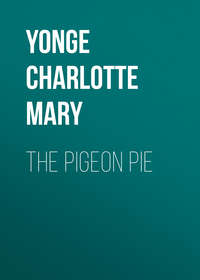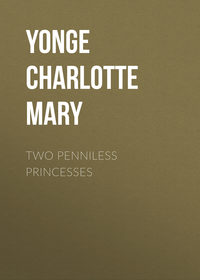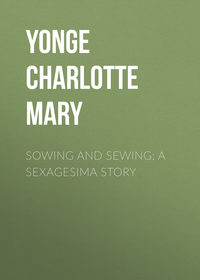
Chantry House
‘You don’t understand, Griff; it is all dear Ellen’s conscientiousness—’
‘Oh, deliver me from such con-sci-en-tious-ness,’ he answered, in a tone of bitter mimicry, and flung out of the room leaving Emily in tears.
He could not appreciate the nobleness of Ellen’s self-command and the obedience which was the security of future happiness, but was hurt at what he thought weak alienation. One note of sympathy would have done much for Griff just then. I have often thought it over since, and come to the conclusion that Mrs. Fordyce was justified in the entire separation she brought about. No one can judge of the strength with which ‘true love’ has mastered any individual, nor how far change may be possible; and, on the other hand, unless there were full appreciation of Ellen’s character, she might only have been looked on as—
‘Puppet to a father’s threat,Servile to a shrewish tongue.’Yet, after all, Frank Fordyce was very kind to Griff, making himself as much of a medium of communication as he could consistently with his conscience, but of course not satisfying one who believed that the strength of love was to be proved not by obedience but disobedience.
Ellen’s letters showed increasing anxiety about her grandfather, who was not favourably affected by the change of habits, consequent on a long journey, and staying in different houses. His return was fixed two or three times, and then delayed by slight attacks of illness, till at last he became anxious to get home, and set off about the end of September; but after sleeping a night at an inn at Warwick, he was too ill to proceed any farther. His old man-servant was with him; but poor Ellen went through a great deal of suspense and responsibility before her parents reached her. The attack was paralysis, and he never recovered the full powers of mind or body, though they managed to bring him back to Hillside—as indeed his restlessness longed for his native home. When once there he became calmer, but did not rally; and a second stroke proved fatal just before Easter. He was mourned alike by rich and poor, ‘He was a gentleman,’ said even Chapman, ‘always the same to rich or poor, though he was one of they Fordys.’
My father wrote to summon both his elder sons to the funeral at Hillside, and in due time Clarence appeared by the coach, but alone. He had gone to Griffith’s chambers to arrange about coming down together, but found my father’s letter lying unopened on the table, and learnt that his brother was supposed to be staying at a villa in Surrey, where there were to be private theatricals. He had forwarded the letter thither, and it would still be possible to arrive in time by the night mail.
So entirely was Griff expected that the gig was sent to meet him at seven o’clock the next morning, but there was no sign of him. My father and Clarence went without him to the gathering, which showed how deeply the good old man was respected and loved.
It was the only funeral Clarence had attended except Miss Newton’s hurried one, and his sensitive spirit was greatly affected. He had learnt reserve when amongst others, but I found that he had a strong foreboding of evil; he tossed and muttered in his sleep, and confessed to having had a wretched night of dreams, though he would not describe them otherwise than that he had seen the lady whose face he always looked on as a presage of evil.
Two days later the Morning Post gave a full account of the amateur theatricals at Bella Vista, the seat of Benjamin Bullock, Esquire, and the Lady Louisa Bullock; and in the list of dramatis personæ, there figured Griffith Winslow, Esquire, as Captain Absolute, and the fair and accomplished Lady Peacock as Lydia Languish.
Amateur theatricals were much less common in those days than at present, and were held as the ne plus ultra of gaiety. Moreover, the Lady Louisa Bullock was noted for fashionable extravagance of the semi-reputable style; and there would have been vexation enough at Griffith’s being her guest, even had not the performance taken place on the very day of the funeral of Ellen’s grandfather, so as to be an outrage on decorum.
At the same time, there came a packet franked by a not very satisfactory peer, brother to Lady Louisa. My father threw a note over to Clarence, and proceeded to read a very properly expressed letter full of apologies and condolences for the Fordyces.
‘He could not have got the letter in time’ was my father’s comment. ‘When did you forward the letter? How was it addressed? Clarence, I say, didn’t you hear?’
Clarence lifted up his face from his letter, so much flushed that my mother broke in—‘What’s the matter? A mistake in the post-town would account for the delay. Has he had the letter?’
‘Oh yes.’
‘Not in time—eh?’
‘I’m afraid,’ and he faltered, ‘he did.’
‘Did he or did he not?’ demanded my mother.
‘What does he say?’ exclaimed my father.
‘Sir’ (always an unpropitious beginning for poor Clarence), ‘I should prefer not showing you.’
‘Nonsense!’ exclaimed my mother: ‘you do no good by concealing it!’
‘Let me see his letter,’ said my father, in the voice there was no gainsaying, and absolutely taking it from Clarence. None of us will ever forget the tone in which he read it aloud at the breakfast-table.
‘Dear Bill—What possessed you to send a death’s-head to the feast? The letter would have bitten no one in my chambers. A nice scrape I shall be in if you let out that your officious precision forwarded it. Of course at the last moment I could not upset the whole affair and leave Lydia to languish in vain. The whole thing went off magnificently. Keep counsel and no harm is done. You owe me that for sending on the letter.—Yours,
‘J. G. W.’Clarence had not read to the end when the letter was taken from him. Indeed to inclose such a note in a dispatch sure to be opened en famille was one of Griffith’s haphazard proceedings, which arose from the present being always much more to him than the absent. Clarence was much shocked at hearing these last sentences, and exclaimed, ‘He meant it in confidence, papa; I implore you to treat it as unread!’
My father was always scrupulous about private letters, and said, ‘I beg your pardon, Clarence; I should not have forced it from you. I wish I had not seen it.’
My mother gave something between a snort and a sigh. ‘It is right for us to know the truth,’ she said, ‘but that is enough. There is no need that they should know at Hillside what was Griffith’s alternative.’
‘I would not add a pang to that dear girl’s grief,’ said my father; ‘but I see the Fordyces were right. I shall never do anything to bring these two together again.’
My mother chimed in with something about preferring Lady Peacock and the Bella Vista crew to Ellen and Hillside, which made us rush into the breach with incoherent defence.
‘I know how it was,’ said Clarence. ‘His acting is capital, and of course these people could not spare him, nor understand how much it signified that he should be here. They make so much of him.’
‘Who do?’ asked my mother. ‘Lady Peacock? How do you know? Have you been with them?’
‘I have dined at Mr. Clarkson’s,’ Clarence avowed; and, on further pressure, it was extracted that Griffith—handsome, and with talents such as tell in society—was a general favourite, and much engrossed by people who found him an enlivenment and ornament to their parties. There had been little or nothing of late of the former noisy, boyish dissipation; but that the more fashionable varieties were getting a hold on him became evident under the cross-questioning to which Clarence had to submit.
My father said he felt like a party to a falsehood when he sent Griff’s letter up to Hillside, and he indemnified himself by writing a letter more indignant—not than was just, but than was prudent, especially in the case of one little accustomed to strong censure. Indeed Clarence could not restrain a slight groan when he perceived that our mother was shut up in the study to assist in the composition. Her denunciations always outran my father’s, and her pain showed itself in bitterness. ‘I ought to have had the presence of mind to refuse to show the letter,’ he said; ‘Griff will hardly forgive me.’
Ellen looked very thin, and with a transparent delicacy of complexion. She had greatly grieved over her grandfather’s illness and the first change in her happy home; and she must have been much disappointed at Griffith’s absence. Emily dreaded her mention of the subject when they first met.
‘But,’ said my sister, ‘she said no word of him. All she cared to tell me was of the talks she had with her grandfather, when he made her read his favourite chapters in the Bible; and though he had no memory for outside things, his thoughts were as beautiful as ever. Sometimes his face grew so full of glad contemplation that she felt quite awestruck, as if it were becoming like the face of an angel. It made her realise, she said, “how little the ups and downs of this life matter, if there can be such peace at the last.” And, after all, I could not help thinking that it was better perhaps that Griff did not come. Any other sort of talk would have jarred on her just now, and you know he would never stand much of that.’
Much as we loved our Griff, we had come to the perception that Ellen was a treasure he could not esteem properly.
The Lester cousins, never remarkable for good taste, forced on her the knowledge of his employment. Her father could not refrain from telling us that her exclamation had been, ‘Poor Griff, how shocked he must be! He was so fond of dear grandpapa. Pray, papa, get Mr. Winslow to let him know that I am not hurt, for I know he could not help it. Or may I ask Emily to tell him so?’
I wish Mrs. Fordyce would have absolved her from the promise not to mention Griff to us. That innocent reliance might have touched him, as Emily would have narrated it; but it only rendered my father more indignant, and more resolved to reserve the message till a repentant apology should come. And, alas! none ever came. Just wrath on a voiceless paper has little effect. There is reason to believe that Griff did not like the air of my father’s letter, and never even read it. He diligently avoided Clarence, and the pain and shame his warm heart must have felt only made him keep out of reach.
CHAPTER XXXI
FACILIS DESCENSUS
‘The slippery verge her feet beguiled; She tumbled headlong in.’Gray.One of Griffith’s briefest notes in his largest hand announced that he had accepted various invitations to country houses, for cricket matches, archery meetings, and the like; nor did he even make it clear where his address would be, except that he would be with a friend in Scotland when grouse-shooting began.
Clarence, however, came home for a brief holiday. He was startled at the first sight of Ellen. He said she was indeed lovelier than ever, with an added sweetness in her clear eyes and the wild rose flush in her delicate cheek; but that she looked as if she was being refined away to nothing, and was more than ever like the vision with the lamp.
Of course the Fordyces had not been going into society, though Ellen and Emily were as much together as before, helping one another in practising their school children in singing, and sharing in one another’s studies and pursuits. There had been in the spring a change at Wattlesea; the old incumbent died, and the new one was well reported of as a very earnest hardworking man. He seemed to be provided with a large family, and there was no driving into Wattlesea without seeing members of it scattered about the place.
The Fordyces being anxious to show them attention without a regular dinner-party, decided on inviting all the family to keep Anne’s ninth birthday, and Emily and Martyn were of course to come and assist at the entertainment.
It was on the morning of the day fixed that a letter came to me whose contents seemed to burn themselves into my brain. Martyn called across the breakfast-table, ‘Look at Edward! Has any one sent you a young basilisk?’
‘I wish it was,’ I gasped out.
‘Don’t look so,’ entreated Emily. ‘Tell us! Is it Griff?’
‘Not ill-hurt?’ cried my mother. ‘Oh no, no. Worse!’ and then somehow I articulated that he was married; and Clarence exclaimed, ‘Not the Peacock!’ and at my gesture my father broke out. ‘He has done for himself, the unhappy boy. A disgraceful Scotch marriage. Eh?’
‘It was his sense of honour,’ I managed to utter.
‘Sense of fiddlestick!’ said my poor father. ‘Don’t stop to excuse him. We’ve had enough of that! Let us hear.’
I cannot give a copy of the letter. It was so painful that it was destroyed; for there was a tone of bravado betraying his uneasiness, but altogether unbecoming. All that it disclosed was, that some one staying in the same house had paid insulting attentions to Lady Peacock; she had thrown herself on our brother’s protection, and after interfering on her behalf, he had found that there was no means of sheltering her but by making her his wife. This had been effected by the assistance of the lady of the house where they had been staying; and Griffith had written to me two days later from Edinburgh, declaring that Selina had only to be known to be loved, and to overcome all prejudices.
‘Prejudices,’ said my father bitterly. ‘Prejudices in favour of truth and honour.’
And my mother uttered the worst reproach of all, when in my agitation, I slipped and almost fell in rising—‘Oh, my poor Edward! that I should have lived to think yours the least misfortune that has befallen my sons!’
‘Nay, mother,’ said Clarence, putting Martyn toward her, ‘here is one to make up for us all.’
‘Clarence,’ said my father, ‘your mother did not mean anything but that you and Edward are the comfort of our lives. I wish there were a chance of Griffith redeeming the past as you have done; but I see no hope of that. A man is never ruined till he is married.’
At that moment there was a step in the hall, a knock at the door, and there stood Mr. Frank Fordyce. He looked at us and said, ‘It is true then.’
‘To our shame and sorrow it is,’ said my father. ‘Fordyce, how can we look you in the face?’
‘As my dear good friend, and my father’s,’ said the kind man, shaking him by the hand heartily. ‘Do you think we could blame you for this youth’s conduct? Stay’—for we young ones were about to leave the room. ‘My poor girl knows nothing yet. Her mother luckily got the letter in her bedroom. We can’t put off the Reynoldses, you know, so I came to ask the young people to come up as if nothing had happened, and then Ellen need know nothing till the day is over.’
‘If I can,’ said Emily.
‘You can be capable of self-command, I hope,’ said my mother severely, ‘or you do not deserve to be called a friend.’
Such speeches might not be pleasant, but they were bracing, and we all withdrew to leave the elders to talk it over together, when, as I believe, kind Parson Frank was chiefly concerned to argue my parents out of their shame and humiliation.
Clarence told us what he knew or guessed; and we afterwards understood the matter to have come about chiefly through poor Griff’s weakness of character, and love of amusement and flattery. The boyish flirtation with Selina Clarkson had never entirely died away, though it had been nothing more than the elder woman’s bantering patronage and easy acceptance of the youth’s equally gay, jesting admiration. It had, however, involved some raillery on his attachment to the little Methodistical country girl, and this gradually grew into jealousy of her—especially as Griff became more of a man, and a brilliant member of society. The detention from the funeral had been a real victory on the widow’s part, and the few times when Clarence had seen them together he had been dismayed at the cavaliere serviente terms on which Griff seemed to stand; but his words of warning were laughed down. The rest was easy to gather. He had gone about on the round of visits almost as an appendage to Lady Peacock, till they came to a free and easy house, where her coquetry and love of admiration brought on one of those disputes which rendered his championship needful; and such defence could only have one conclusion, especially in Scotland, where hasty private marriages were still legal. What an exchange! Only had Griff ever comprehended the worth of his treasure?
Emily went as late as she could, that there might be the less chance of a tête-à-tête, in which she might be surprised into a betrayal of her secret: indeed she only started at last when Martyn’s impatience had become intolerable.
What was our amazement when, much earlier than we expected, we saw Mr. Fordyce driving up in his phaeton, and heard the story he had to tell.
Emily’s delay had succeeded in bringing her only just in time for the luncheon that was to be the children’s dinner. There was a keen-looking, active, sallow clergyman, grizzled, and with an air of having seen much service; a pale, worn wife, with a gentle, sensible face; and a bewildering flock of boys and girls, all apparently under the command of a very brisk, effective-looking elder sister of fourteen or fifteen, who seemed to be the readiest authority, and to decide what and how much each might partake of, among delicacies, evidently rare novelties.
The day was late in August. The summer had broken; there had been rain, and, though fine, the temperature was fitter for active sports than anything else. Croquet was not yet invented, and, besides, most of the party were of the age for regular games at play. Ellen and Emily did their part in starting these—finding, however, that the Reynolds boys were rather rough, in spite of the objurgations of their sister, who evidently thought herself quite beyond the age for romps. The sports led them to the great home-field on the opposite slope of the ridge from our own. The new farm-buildings were on the level ground at the bottom to the right, where the declivity was much more gradual than to the left, which was very steep, and ended in furze bushes and low copsewood. It was voted a splendid place for hide-and-seek, and the game was soon in such full career that Ellen, who had had quite running enough, could fall out of it, and with her, the other two elder girls. Emily felt Fanny Reynolds’ presence a sort of protection, ‘little guessing what she was up to,’ to use her own expression. Perhaps the girl had not earlier made out who Emily was, or she had been too much absorbed in her cares; but, as the three sat resting on a stump overlooking the hill, she was prompted by the singular inopportuneness of precocious fourteen to observe, ‘I ought to have congratulated you, Miss Winslow.’
Emily gabbled out, ‘Thank you, never mind,’ hoping thus to put a stop to whatever might be coming; but there was no such good fortune. ‘We saw it in the paper. It is your brother, isn’t it?’
‘What?’ asked unsuspicious Ellen, thinking, no doubt, of some fresh glory to Griffith.
And before Emily could utter a word, if there were any she could have uttered, out it came. ‘The marriage—John Griffith Winslow, Esquire, eldest son of John Edward Winslow of Chantry House, to Selina, relict of Sir Henry Peacock and daughter of George Clarkson, Esquire, Q.C. I didn’t think it could be you at first, because you would have been at the wedding.’
Emily had not even time to meet Ellen’s eyes before they were startled by a shriek that was not the merry ‘whoop’ and ‘I spy’ of the game, and, springing up, the girls saw little Anne Fordyce rushing headlong down the very steepest part of the slope, just where it ended in an extremely muddy pool, the watering-place of the cattle. The child was totally unable to stop herself, and so was Martyn, who was dashing after her. Not a word was said, though, perhaps, there was a shriek or two, but the elder sisters flew with one accord towards the pond. They also were some way above it, but at some distance off, so that the descent was not so perpendicular, and they could guard against over-running themselves. Ellen, perhaps from knowing the ground better, was far before the other two; but already poor little Anne had gone straight down, and fallen flat on her face in the water, Martyn after her, perhaps with a little more free will, for, though he too fell, he was already struggling to lift Anne up, and had her head above water, when Ellen arrived and dashed in to assist.
The pond began by being shallow, but the bottom sloped down into a deep hollow, and was besides covered several feet deep with heavy cattle-trodden mire and weeds, in which it was almost impossible to gain a footing, or to move. By the time Emily and Miss Reynolds had come to the brink, Ellen and Martyn were standing up in the water, leaning against one another, and holding poor little Anne’s head up—all they could do. Ellen called out, ‘Don’t! don’t come in! Call some one! The farm! We are sinking in! You can’t help! Call—’
The danger was really terrible of their sinking in the mud and weeds, and being sucked into the deep part of the pool, and they were too far in to be reached from the bank. Emily perceived this, and ran as she had never run before, happily meeting on the way with the gentlemen, who had been inspecting the new model farm-buildings, and had already taken alarm from the screams.
They found the three still with their heads above water, but no more, for every struggle to get up the slope only plunged them deeper in the horrible mud. Moreover, Fanny Reynolds was up to her ankles in the mud, holding by one of her brothers, but unable to reach Martyn. It seems she had had some idea of forming a chain of hands to pull the others out.
Even now the rescue was not too easy. Mr. Fordyce hurried in, and took Anne in his arms; but, even with his height and strength, he found his feet slipping away under him, and could only hand the little insensible girl to Mr. Reynolds, bidding him carry her at once to the house, while he lifted Martyn up only just in time, and Ellen clung to him. Thus weighted, he could not get out, till the bailiff and another man had brought some faggots and a gate that were happily near at hand, and helped him to drag the two out, perfectly exhausted, and Martyn hardly conscious. They both were carried to the Rectory,—Ellen by her father, Martyn by the foreman,—and they were met at the door by the tidings that little Anne was coming to herself.
Indeed, by the time Mr. Fordyce had put on dry clothes, all three were safe in warm beds, and quite themselves again, so that he trusted that no mischief was done; though he decided upon fetching my mother to satisfy herself about Martyn. However, a ducking was not much to a healthy fellow like Martyn, and my mother found him quite fit to dress himself in the clothes she brought, and to return home with her. Both the girls were asleep, but Ellen had had a shivering fit, and her mother was with her, and was anxious. Emily told her mother of Fanny Reynolds’ unfortunate speech, and it was thought right to mention it. Mrs. Fordyce listened kindly, kissed Emily, and told her not to be distressed, for possibly it might turn out to have been the best thing for Ellen to have learnt the fact at such a moment; and, at any rate, it had spared her parents some doubt and difficulty as to the communication.
CHAPTER XXXII
WALY, WALY
‘And am I then forgot, forgot?It broke the heart of Ellen!’Campbell.Clarence and Martyn walked over to Hillside the first thing the next morning to inquire for the two sisters. As to one, they were quickly reassured, for Anne was in the porch feeding the doves, and no sooner did she see them than out she flew, and was clinging round Martyn’s neck, her hat falling back as she kissed him on both cheeks, with an eagerness that made him, as Clarence reported, turn the colour of a lobster, and look shy, not to say sheepish, while she exclaimed, ‘ Oh, Martyn! mamma says she never thanked you, for you really and truly did save my life, and I am so glad it was you—’
‘It was not I, it was Ellen,’ gruffly muttered Martyn.
‘Oh yes! but papa says I should have been smothered in that horrid mud, before Ellen could get to me if you had not pulled me up directly.’
The elders came out by this time, and Clarence was able to get in his inquiry. Ellen had had a feverish night, and her chest seemed oppressed, but her mother did not think her seriously ill. Once she had asked, ‘Is it true, what Fanny Reynolds said?’ and on being answered, ‘Yes, my dear, I am afraid it is,’ she had said no more; and as the Fordyce habit of treating colds was with sedatives, her mother thought her scarcely awake to the full meaning of the tidings, and hoped to prevent her dwelling on them till she had recovered the physical shock. Having answered these inquiries, the two parents turned upon Martyn, who, in an access of shamefacedness, had crept behind Clarence and a great orange-tree, and was thence pulled out by Anne’s vigorous efforts. The full story had come to light. The Reynolds’ boys had grown boisterous as soon as the restraint of the young ladies’ participation had been removed, and had, whether intentionally or not, terrified little Anne in the chases of hide-and-seek. Finally, one of them had probably been unable to withstand the temptation of seeing her timid nervous way of peeping and prying about; and had, without waiting to be properly found, leapt out of his lair with a roar that scared the little girl nearly out of her wits, and sent her flying, she knew not whither. Martyn was a few steps behind, only not holding her hand, because the other children had derided her for clinging to his protection. He had instantly seen where she was going, and shouted to her to stop and take care; but she was past attending to him, and he had no choice but to dart after her, seeing what was inevitable; while George Reynolds had sense to stop in time, and seek a safer descent. Had Martyn not been there to raise the child instantly from the stifling mud, her sister could hardly have been in time to save her.









